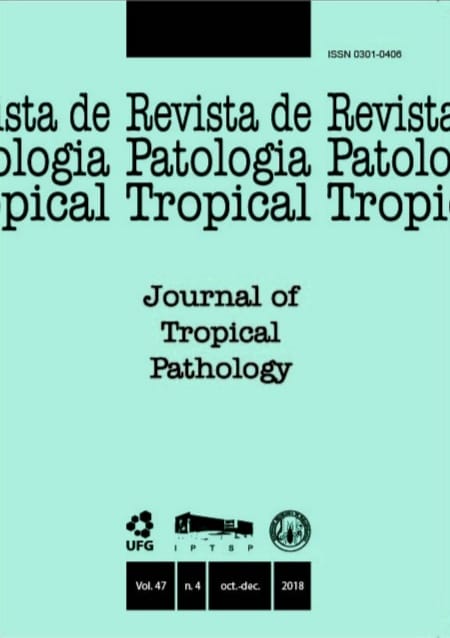OCCURRENCE OF INTESTINAL PARASITES IN COLLECTORS OF RECYCLABLE MATERIALS IN SOUTHERN BRAZIL
DOI:
https://doi.org/10.5216/rpt.v47i4.56743Keywords:
Waste pickers, intestinal parasites, solid waste, basic sanitation, garbageAbstract
Solid waste produced by modern society, together with lack of basic sanitation and poor hygiene practices result in risks to public health. 46 workers from the cities of Pelotas, Canguçu, Morro Redondo, Rio Grande and Capão do Leão were evaluated by parasitological examination of two fecal samples by Ritchie, Hoffman, Pons and Janer- HPJ techniques and Sheather method as well as a consented interview. 47.8% (22/46) of the examined individuals were parasitized, with no significant difference between both groups (garbage dump and recycling volunteers). Most of the samples evaluated presented forms of helminths (68.2%) while protozoa were found in 31.8% of the samples. Helminths found, and their respective prevalence were: Ascaris lumbricoides (31.8%), Ascaris lumbricoides/Trichuris trichiura (18.2%), Trichuris trichiura (9.1%), Taenia sp (4.6%) and Trichuris trichiura/Ancylostomids (4.6%). Protozoa were: Giardia intestinalis (13, 6%), Entamoeba spp. (9.1%) and Endolimax nana (9.1%). Monoparasitism was observed in 77.3% of the cases. Most of the population consisted of women, 21-40 years of age, low educational level and monthly income less than one minimum wage. The majority of the workers did not use protective equipment. Multivariate analysis revealed that infection from parasites in scavengers who lived near open sewers was 6.65 times higher (p = 0.0065) than in the other workers. In the localities studied, our results showed that the risk of acquiring parasitic infections was related to poor sanitation and the lack of sewerage systems; and not actually due to handling these types of waste. The parasitological indices found are similar to those described previously in other parts of the country.Downloads
Downloads
Published
How to Cite
Issue
Section
License
The manuscript submission must be accompanied by a letter signed by all authors stating the full name and email address, confirming that the material has not been published or is under consideration for publication elsewhere, and agreeing to transfer copyright in all media and formats for Journal of Tropical Pathology. The authors will not be paid for published articles. They are solely responsible for the content of those articles, even if the Editor holds the right to adjust them to the norms of the journal.
The reviewers will not be paid for the peer review process.

